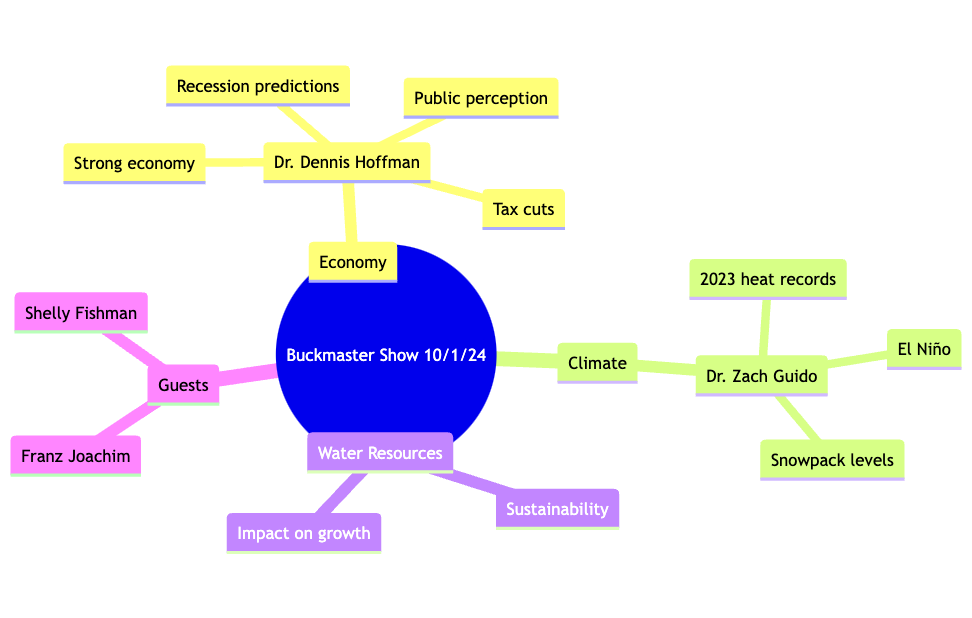🌡️ Tucson Turns Up the Heat: 2024 Among Hottest Years on Record
☔ El Niño's Return: Hope or Hype for Parched Southwest? 🏔️ Melting Away: The Silent Threat to Western Water Supply
Based on the 10/01/24 Buckmaster Show on KVOI-1030AM.
🙊 Notable quotes from the show
"The economy remains quite strong. Many economists are still looking for that long predicted recession" - Dr. Dennis Hoffman, highlighting the unexpected resilience of the economy
"We've never had a Federal Reserve tightening cycle that has been this severe without triggering one [a recession]" - Dr. Dennis Hoffman, emphasizing the unique nature of the current economic situation
"2023 for Tucson, and it was tied for the third warmest on record" - Dr. Zach Guido, underscoring the local impacts of climate change
"If I had to make one prediction, I think it's going to be another near-record year globally when we talk about global temperatures" - Dr. Zach Guido, forecasting continued global warming
"The vast majority of them are showing snowpack conditions at less than 50% of their long-term median" - Dr. Zach Guido, revealing the alarming state of Western U.S. snowpack levels
⏮️ ICYMI: From the Last Show…
😽 Keepin’ It Simple Summary for Younger Readers
👧🏾✊🏾👦🏾
🗝️ Takeaways
💰 The economy remains strong despite recession predictions, but public perception lags
🌡️ 2023 tied for 3rd warmest year in Tucson, reflecting global warming trends
🌊 Strong El Niño expected, but past events don't guarantee above-average rainfall
❄️ Western U.S. snowpack at critically low levels, raising water scarcity concerns
📊 Climate change impacts are more detectable in temperature than precipitation data
📻 What They Discussed
On October 1, 2024, the Buckmaster Show featured two distinguished guests:
Dr. Dennis Hoffman, Director of the L. William Seidman Research Institute at Arizona State University's W.P. Cary School of Business and
Dr. Zach Guido is an assistant research professor at the University of Arizona's Arizona Institute for Resilience.
These experts provided insights on the economic outlook for 2024 and climate trends, respectively, offering listeners a comprehensive view of Arizona's challenges and opportunities in the new year.
💼 Economic Outlook: Navigating Uncertainty in 2024
Dr. Dennis Hoffman's economic analysis painted a picture of an economy that defies easy categorization. Despite widespread predictions of a recession, Hoffman noted that the economy remains strong, with a resilient labor market. He pointed out the unprecedented nature of the current economic situation, stating, "We've never had a Federal Reserve tightening cycle that has been this severe without triggering one [a recession]."
However, Hoffman also highlighted a significant disconnect between economic indicators and public perception. While data shows wage growth for the lowest 40% of earners outpacing inflation, polls suggest widespread economic pessimism. This disparity raises important questions about the factors influencing public opinion and the limitations of traditional economic metrics in capturing the lived experiences of many Americans.
Hoffman expressed concerns about Arizona's fiscal future, particularly in light of recent tax cuts and reduced federal support. He noted, "The challenge that we face, I think, in the state stems from the fact that over the last three to five years we've taken a lot of money from the federal government... and all the while we've made major reductions in tax rates." This situation could potentially lead to budget constraints for the state in the coming years, especially if economic conditions worsen.
The discussion also touched on the potential political implications of economic perceptions, with Hoffman suggesting that negative economic narratives might be influencing public opinion more than actual economic conditions.
🌡️ Climate Crisis: Tucson's Rising Mercury and Global Warming Trends
Dr. Zach Guido provided a sobering update on Tucson's climate, revealing that 2023 tied for the third warmest year on record for the city. This local trend is part of a larger global pattern, with 2023 being the hottest year on record worldwide. Guido emphasized the clear signal of climate change in temperature data, stating, "Almost, there's been a persistent warming. We all know this. That's the climate change signal."
The climate scientist predicted that 2024 could be another record-breaking year globally, partly due to the influence of a strong El Niño event. He explained that El Niño events typically lead to global temperature spikes about six months after they wane, as heat from warmer sea surface temperatures in the tropical Pacific Ocean is diffused into the atmosphere.
Guido also highlighted the challenges in detecting climate change signals in precipitation patterns, noting that there's much more variability in rainfall compared to temperature. This variability makes it more difficult to discern long-term trends in precipitation, even as climate change affects weather patterns.
🌊 El Niño and Southwestern Water Resources
The discussion turned to the current El Niño conditions and their potential impact on the Southwest. While El Niño typically brings above-average rainfall to the region, Guido cautioned that this isn't always the case. He cited the 2015-2016 El Niño event, which was strong but resulted in below-average rainfall for the Southwest.
Guido explained that predicting El Niño's effects is more reliable than forecasting monsoon patterns, due to the slower-changing nature of sea surface temperatures compared to the complex factors influencing monsoon rains. However, he emphasized that El Niño predictions still only "tip the odds" rather than providing certainty.
The conversation also touched on the potential for both warm and cold storms during El Niño conditions, highlighting the complex interplay between global weather patterns and local climate impacts.
❄️ Western Snowpack Crisis: A Looming Water Emergency
Perhaps the most alarming revelation came from Guido's comments on Western U.S. snowpack levels. He reported, "I'm looking at a map right now of like all of the higher elevation sites from Colorado West to California up north to Washington. And the vast majority of them are showing snowpack conditions at less than 50% of their long-term median."
This shortage of snowpack has serious implications for water resources across the Western states, including Arizona. It highlights the ongoing drought conditions and the potential for water scarcity to become an even more pressing issue in the coming years.
The discussion of snowpack levels tied into broader concerns about water sustainability in the Southwest, a topic that was briefly mentioned in relation to its potential impact on growth and real estate in Arizona. This connection underscores the complex interplay between climate change, water resources, and economic development in the region.
If you enjoyed this article, buy us a cup of coffee! We 🤎☕‼️
👯 People Mentioned
Bill Buckmaster - Host of the Buckmaster Show, celebrating 13 years on air
Quote: "Listener opinions matter, respect the audience, it's a forum for ideas, quality guests, and informed listeners"
Dr. Dennis Hoffman - Economist at Arizona State University
Quote: "The challenge that we face, I think, in the state stems from the fact that over the last three to five years, we've taken a lot of money from the federal government... and all the while, we've made major reductions in tax rates."
Dr. Zach Guido - Climate scientist at the University of Arizona
Quote: "Almost, there's been a persistent warming. We all know this. That's the climate change signal"
Shelly Fishman - Regular contributor to the Buckmaster Show
Quote: "There is not going to be a recession this year. There you go. The Fed has in fact already engineered a soft landing"








